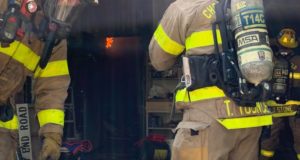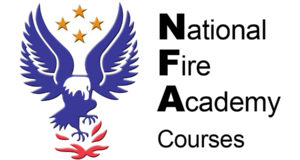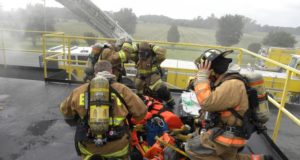In doing some research online regarding firefighter safety, I came across this "oldie but goodie" from one of the legends of the fire service in the U.S., the late Ronny Coleman. For firefighters and officers of a certain age, we grew up with Chief Coleman particularly as we read his classic monthly column in the old Fire Chief Magazine (the hard copy), The Chief's Clipboard. For me, reading that column provided my first real taste of officer development as I'd just been promoted to a company officer position in my department, the Chesterfield (Va.) Fire and EMS Department, nee the Chesterfield Fire Department. This was one such column.
Read More »Tag Archives: fire department management
NFPA 1407: 14 years later, what’s your RIC policy?
In the fourteen years since its initial publication, NFPA 1407 has been a big part of fire departments elevating the "status" of the RIC as a critical fireground task assignment on par with that of search, fire attack, ventilation, and laddering. While this has been a positive step in the right direction regarding firefighter safety, the RIC is a "reactive" approach to firefighter safety. The RIC is in the "background" until something goes wrong (e.g., a firefighter becomes lost, entrapped or otherwise endangered). The presence of the RIC can also provide a false sense of security, especially when the RIC consists of only two firefighters.
Read More »What’s in Your Fire Department’s Behavioral Health “Toolbox?”
Fire departments that are looking to provide an effective behavioral health program for their members would do well to model the approach that the fire service has taken with its tiered response to hazardous materials incidents. They would further serve the best interests of their firefighters by collaborating with mental health clinicians, preferably those at the Specialist Level, just as they would if developing their own hazardous materials response team.
Read More »Researchers should not be developing mental health care strategies for firefighters
And that's why we need to have a field of Fire Psychology that's been developed using fire service leaders and mental health practitioners of all "shapes and sizes" if we are to develop and implement better mental health programs for fire service personnel.
Read More »Developing Mission, Vision, and Value Statements for Your Fire and EMS Department
Developing and communicating a department's mission, vision, and values are important organizational management tools for any fire and EMS department, especially one that's committed to getting the best performance from its members and delivering the best service to its external stakeholders.
Read More »Why is sexism and misogyny still a problem for the fire service? It’s almost 2023!
I posted the following reply to this COURAGEOUS firefighter in the UK who continues to "shine a light" on the sexism and misogyny that apparently "alive and well" in the London Fire Brigade and other fire brigades in the UK. Antonia, do whatever you must do but PLEASE do not let the ba$tards prevail by taking your own life! I hope that the supportive comments in this space are helping you to keep your "head above water!" But it's not solely a problem in the fire service culture in the UK. Sexism and misogyny are both "alive and well" in too many fire departments around the globe, including the U.S. and Canada.
Read More »Where are the Champions in the Fire Service?
I'm not referring to individuals or teams that have attained the #1 status in their sport. Rather, I'm going to discuss the dearth of champions in fire and EMS departments who can turn the word champion (the noun) into champion (the verb). The key difference between mentors and sponsors is that mentors are “one-way streets”, giving their chosen mentee a gift of wisdom, time, and advice. Sponsorship requires reciprocity and commitment; sponsors serve as champions.
Read More »Five Reasons Why You Should Attend Class at The National Fire Academy
This past Friday and Saturday, I attended the 32nd Executive Fire Officer and Leadership Symposium at the National Fire Academy in Emmitsburg, Maryland. It was the first time I'd returned to NFA since about 2005 or 2006. This was my first time, however, returning as a freelance writer and not an active fire officer with the Chesterfield (Va.) Fire and EMS Department, where I served for 26 years. Nonetheless, I still got the same “chills down my spine” as I drove onto campus (After having my car inspected by campus security), that feeling I was returning home to what I and many others consider “the home of the American Fire Service.”
Read More »An Objective Tool for Evaluating a Response to a “Firefighter Mayday!”
I believe that a fire department that would use such a template for its post-incident review of a “Firefighter Mayday!” declaration would objectively gather the necessary information to have a positive influence for how it responds to future "Firefighter Mayday" situations.
Read More »Gordon Graham: The “Go to Guy” for Understanding Risk Management in Public Safety
I first heard Gordon Graham speak about risk management in the realm of public safety many years ago when he was the keynote speaker at the Mid-Winter Conference of the Virginia Fire Chiefs Association. From that moment I became a true believer in one of Graham’s core tenets “Predictable is preventable,” along with his concept of evaluating risk in public safety by asking two key questions. What’s the level of risk for an activity or operation? What’s the frequency for that risk?
Read More » Fire & EMS Leader Pro The job of old firefighters is to teach young firefighters how to become old firefighters!
Fire & EMS Leader Pro The job of old firefighters is to teach young firefighters how to become old firefighters!









